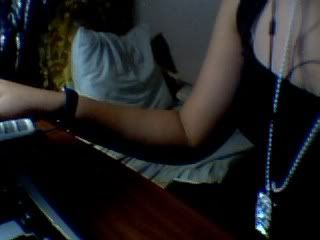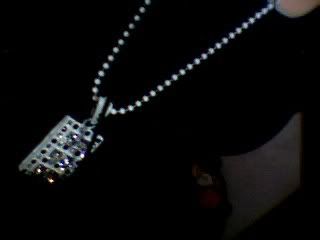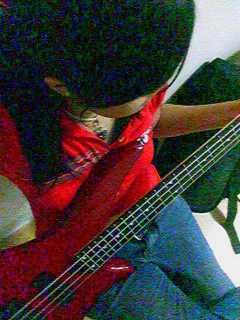RJ is Also Listening
FEW names reach familiarity. But if your appellation, particularly your initials are rung frequently in the airwaves, stamped at world-class guitars and concert venues in the metro, you’re more than a ring to the ears - you’re already a bequest in history. In Philippine history, one man reached such acclaim: Ramon Jacinto, the RJ of music industry.
On a Saturday midday, when Makati corporates are hustling out for lunch, businessman and musician Ramon Jacinto arrives in his recording studio, stoic and tranquil, from a visit to one of his guitar stores in Pasig. Once inside the soundproof room equipped with sound amplifiers, flat screen computers, and memorabilia posters partly flaunting his achievements, he eases on a chair for the interview.
Also named as “The Guitarman” by a disc jock, Ramon Jacinto’s legacy can be mirrored instantly in his businesses. Most of his assets are named after him, among them RJ Guitars, DZRJ, RJ 100 FM, RJ TV and RJ Bar. But what relates these holdings, aside from his initials, is the thing that also binds every inch of him: His passion for music.
The third of the eight children of National Steel Corp. founder Don Fernando Jacinto, RJ came from a family of businessmen. “My father was always nationalistic,” he says. “We put up a steel mill as foundations for the country.”
He set up RJ Enterprise, a production that recorded his first band, RJ and the Riots, even before he finished his Economics major at Ateneo de Manila. His band became popular until the late 60’s, and from his group’s name, he decided to name his music-related businesses after his initials.
After graduating, he worked at his father’s steel mill for awhile before taking up Law at the University of Santo Tomas. He established more businesses later like Ventures Bank, a retail store called Save a Lot, real estates and financing businesses, among others.
“I had many other businesses before,” RJ says. However, he chose to focus more on his holdings related to music, a business he started at his parent’s backyard when he was 17 years old.
“I noticed the radio station business here that time, very limited music was being played.” He explains. “So I said, maybe if I put up a station and I played the latest releases from America, a lot of people would listen.” From there, he established DZRJ, which is still operating in the 810 AM frequency.
But when Martial Law was declared in September 21, 1972, the business went off his hands and into the military for awhile. But before he could end up in jail, Ramon and other patriots like Ninoy Aquino already went to the United States, where they became exiles for 14 and a half years. They continued their nationalist advocacies abroad. “We tried opposing him (Marcos) from there.” He and his companions went around, with Ninoy Aquino making speeches and RJ taking part in putting up Movement for Free Philippines and raising funds for the opposition.
RJ also continued making music while in exile. He had a weekend band, and he also recorded “Muli,” a song about his divorce which also became a hit, to his surprise, when he secretly sent it to the Philippines.
When the EDSA Revolution broke out in 1986, RJ’s radio station, renamed “Radyo Bandido” that time, was used by the Enrile faction to urge people to join the revolution after the standby transmitter of Radio Veritas failed. It was later honored with “EDSA Award of Freedom” after serving as the voice of freedom during the historic event.
RJ went back to the Philippines in March 5, 1986. He regained Radyo Bandido, and the station continued to be a news public-affairs station in the AM band. In the late 70’s, he started RJ 100 FM. He continued to air pop hits, like what he did on his first radio station. His radio stations were also the first to discover many talents, among them the group Sampaguita, Heber, and Florante. “They were considered freaks, no radio station wanted to feature them,” RJ says. “So we did and we discovered them.”
RJ continued their mission of discovering artists, this time underground rock bands, when he established RJ Underground Radio 105.9 last year. It played the rock music of the 70’s onwards and original records of aspiring rock music groups.
He wanted to give exposure to good musicians, he explains. But it was not just other artists RJ led to improvement. His music-related businesses also helped him to continue playing his music and keep his guitar-playing skills alive.
Talking of guitar, RJ also expanded his guitar craftmanship through his guitar-manufacturing business, RJ guitars. When he returned to the country after Martial Law, he recovered two of his vintage guitars from the military. But the valuable guitars need refurbishing, so he looked for the best repairman of guitars. He found Rudy Discipulo, who revamped RJ’s Fender Jazz Master Guitar and brought back its tune to good condition. RJ was impressed, then decided to buy Discipulo’s shop, who then held an office in a small office in Quezon City. Up to now, even if Discipulo has passed away, RJ guitars continued to sell world-class guitars at different parts of the country. He also designed guitar pick-up configurations, one of them a guitar than can change to five different sounds, which will soon be made available in his stores.
Inside his recording studio, a vintage black electric guitar stands. It was not an old guitar, he points out, they just made it look like a relic.
RJ also continued to perform onstage, mostly in his RJ Bar, a concert hall that was known 15 years ago as Bistro RJ at Pasay City. He closed it for two years during the Estrada administration and reopened it as RJ Bar, now situated at Jupiter Street, Makati.
His performances, along with other artists who play in his bar, were also shown live at his TV station, RJ TV. He started venturing in the television business 15 years ago, also founding other channels such as Home TV Shopping and 2nd avenue UHF Free TV.
His contributions to the music scene were endless, but it was probably his recording studio that should be boasted mostly. Talking inside the digitally-equipped, carpeted room, RJ recounts some of the dozens of artists that the recording studio and hislabel, Quantum Records has produced. “This is the place where we produced a lot of hits,” he says. “Andrew E.’s Humanap Ka Ng Pangit, Sampaguita’s Nosi Balasi, Denmark the Rapper…even Michael V.”
Now, at age 63, RJ continues to keep the music scene alive, basically through his music-related businesses. He left some of his assets under the management of his children. Three of his six children work at his broadcast stations.
Looking back to RJ’s history, the radio stations, music bars, and guitar shops he owns today won’t probably exist if RJ did not decide to extend and share to everyone his passion and creativeness. Venturing in music-related business is very risky, he says. Too many people are in it already.
But how did he keep his holding stable? “By listening to a lot of people, by listening to what’s happening now,” RJ says. “Also, by being original. We don’t copy people. We just do what we want. Like RJ FM, (which plays) the greatest and the latest. Nobody thought that would work, but it’s now rating very high, very successful. We combine five decades of music; no other radio station did that. So I guess we listen but we stick to our branding.”
His branding will continue to be a legacy, a presence behind what we hear in the airwaves and behind the instruments we play, that’s for sure. And while we listen to his broadcasts, we can also be certain of one thing: Ramon Jacinto, the RJ of the music industry, is also listening,
FEW names reach familiarity. But if your appellation, particularly your initials are rung frequently in the airwaves, stamped at world-class guitars and concert venues in the metro, you’re more than a ring to the ears - you’re already a bequest in history. In Philippine history, one man reached such acclaim: Ramon Jacinto, the RJ of music industry.
On a Saturday midday, when Makati corporates are hustling out for lunch, businessman and musician Ramon Jacinto arrives in his recording studio, stoic and tranquil, from a visit to one of his guitar stores in Pasig. Once inside the soundproof room equipped with sound amplifiers, flat screen computers, and memorabilia posters partly flaunting his achievements, he eases on a chair for the interview.
Also named as “The Guitarman” by a disc jock, Ramon Jacinto’s legacy can be mirrored instantly in his businesses. Most of his assets are named after him, among them RJ Guitars, DZRJ, RJ 100 FM, RJ TV and RJ Bar. But what relates these holdings, aside from his initials, is the thing that also binds every inch of him: His passion for music.
The third of the eight children of National Steel Corp. founder Don Fernando Jacinto, RJ came from a family of businessmen. “My father was always nationalistic,” he says. “We put up a steel mill as foundations for the country.”
He set up RJ Enterprise, a production that recorded his first band, RJ and the Riots, even before he finished his Economics major at Ateneo de Manila. His band became popular until the late 60’s, and from his group’s name, he decided to name his music-related businesses after his initials.
After graduating, he worked at his father’s steel mill for awhile before taking up Law at the University of Santo Tomas. He established more businesses later like Ventures Bank, a retail store called Save a Lot, real estates and financing businesses, among others.
“I had many other businesses before,” RJ says. However, he chose to focus more on his holdings related to music, a business he started at his parent’s backyard when he was 17 years old.
“I noticed the radio station business here that time, very limited music was being played.” He explains. “So I said, maybe if I put up a station and I played the latest releases from America, a lot of people would listen.” From there, he established DZRJ, which is still operating in the 810 AM frequency.
But when Martial Law was declared in September 21, 1972, the business went off his hands and into the military for awhile. But before he could end up in jail, Ramon and other patriots like Ninoy Aquino already went to the United States, where they became exiles for 14 and a half years. They continued their nationalist advocacies abroad. “We tried opposing him (Marcos) from there.” He and his companions went around, with Ninoy Aquino making speeches and RJ taking part in putting up Movement for Free Philippines and raising funds for the opposition.
RJ also continued making music while in exile. He had a weekend band, and he also recorded “Muli,” a song about his divorce which also became a hit, to his surprise, when he secretly sent it to the Philippines.
When the EDSA Revolution broke out in 1986, RJ’s radio station, renamed “Radyo Bandido” that time, was used by the Enrile faction to urge people to join the revolution after the standby transmitter of Radio Veritas failed. It was later honored with “EDSA Award of Freedom” after serving as the voice of freedom during the historic event.
RJ went back to the Philippines in March 5, 1986. He regained Radyo Bandido, and the station continued to be a news public-affairs station in the AM band. In the late 70’s, he started RJ 100 FM. He continued to air pop hits, like what he did on his first radio station. His radio stations were also the first to discover many talents, among them the group Sampaguita, Heber, and Florante. “They were considered freaks, no radio station wanted to feature them,” RJ says. “So we did and we discovered them.”
RJ continued their mission of discovering artists, this time underground rock bands, when he established RJ Underground Radio 105.9 last year. It played the rock music of the 70’s onwards and original records of aspiring rock music groups.
He wanted to give exposure to good musicians, he explains. But it was not just other artists RJ led to improvement. His music-related businesses also helped him to continue playing his music and keep his guitar-playing skills alive.
Talking of guitar, RJ also expanded his guitar craftmanship through his guitar-manufacturing business, RJ guitars. When he returned to the country after Martial Law, he recovered two of his vintage guitars from the military. But the valuable guitars need refurbishing, so he looked for the best repairman of guitars. He found Rudy Discipulo, who revamped RJ’s Fender Jazz Master Guitar and brought back its tune to good condition. RJ was impressed, then decided to buy Discipulo’s shop, who then held an office in a small office in Quezon City. Up to now, even if Discipulo has passed away, RJ guitars continued to sell world-class guitars at different parts of the country. He also designed guitar pick-up configurations, one of them a guitar than can change to five different sounds, which will soon be made available in his stores.
Inside his recording studio, a vintage black electric guitar stands. It was not an old guitar, he points out, they just made it look like a relic.
RJ also continued to perform onstage, mostly in his RJ Bar, a concert hall that was known 15 years ago as Bistro RJ at Pasay City. He closed it for two years during the Estrada administration and reopened it as RJ Bar, now situated at Jupiter Street, Makati.
His performances, along with other artists who play in his bar, were also shown live at his TV station, RJ TV. He started venturing in the television business 15 years ago, also founding other channels such as Home TV Shopping and 2nd avenue UHF Free TV.
His contributions to the music scene were endless, but it was probably his recording studio that should be boasted mostly. Talking inside the digitally-equipped, carpeted room, RJ recounts some of the dozens of artists that the recording studio and hislabel, Quantum Records has produced. “This is the place where we produced a lot of hits,” he says. “Andrew E.’s Humanap Ka Ng Pangit, Sampaguita’s Nosi Balasi, Denmark the Rapper…even Michael V.”
Now, at age 63, RJ continues to keep the music scene alive, basically through his music-related businesses. He left some of his assets under the management of his children. Three of his six children work at his broadcast stations.
Looking back to RJ’s history, the radio stations, music bars, and guitar shops he owns today won’t probably exist if RJ did not decide to extend and share to everyone his passion and creativeness. Venturing in music-related business is very risky, he says. Too many people are in it already.
But how did he keep his holding stable? “By listening to a lot of people, by listening to what’s happening now,” RJ says. “Also, by being original. We don’t copy people. We just do what we want. Like RJ FM, (which plays) the greatest and the latest. Nobody thought that would work, but it’s now rating very high, very successful. We combine five decades of music; no other radio station did that. So I guess we listen but we stick to our branding.”
His branding will continue to be a legacy, a presence behind what we hear in the airwaves and behind the instruments we play, that’s for sure. And while we listen to his broadcasts, we can also be certain of one thing: Ramon Jacinto, the RJ of the music industry, is also listening,








No comments:
Post a Comment